Ruthi Postow Birch's Blog, page 14
January 18, 2018
The Compassionate, Brave, And Defiant Southern Woman
I grew up in the deep south, and the things you hear about Southern women are true. They can be soft and sweet as pie, but they aren’t weak. They’re defiant. They will break rules to make a difference and take risks that many men would back away from.
A Southern woman who believes in what she is doing has this special thing. It’s attitude. She will say and do what she thinks is right and dare anybody to try to stop her, regardless of the danger. She becomes a force to deal with.
I had never heard the expression, “steel magnolias,” until I left the South. But I thought back to the stories I knew of some exceptional Southern women, and the description fits, except that they weren’t all “magnolias.” These women definitely had the combination of compassion, charm, and steel that the name implies, but they weren’t all white.
The Story Of The Southern Woman On A Train
I grew in a time when white people were segregated from people who were brown or black. Until I was eight or nine, I wasn’t really aware of it. I was just beginning to wonder that the two water fountains, sitting side-by-side, at Kress’s store were not alike, not equal. Then I heard this story about a woman on a train that jolted me with the realization of the terrible impact segregation had on all of us.
My brother Buddy’s wife, Leona, who was pregnant, and their two boys were moving from Texas to Tennessee where my brother had been accepted at Tennessee Temple University Baptist Seminary. They were all packed and ready to go but there was a problem. The baby decided to be born.
Buddy had to get to Chattanooga to start classes, but Leona couldn’t travel for ten days. So, Buddy took the boys and went ahead, and Leona stayed on with her folks till she was well enough. Then she took the train to Mobile where Buddy would come for her.
With Buddy starting seminary and three babies, money was tight. That’s how Leona ended up sitting in a day coach for two days and nights with a baby just ten days after giving birth. I didn’t get it. Why was it such a big deal? And why did Mama keep worrying about how exhausted poor Leona must be. The trip sounded exciting to me. I loved going on the train. I didn’t understand until Leona told us her story.
“Charlene wouldn’t sleep. I tried to keep her quiet but she was fussy. When she cried, people around me were glaring at me and making nasty comments under their breath. Nobody seemed to see how exhausted I was. And nobody offered to help or even said a kind word.”
“By the second night, I felt helpless. Charlene cried, and I sat there and cried with her. Finally, I took her, went into the women’s lounge, laid down on the couch with her on top of me, and tried to sleep.” Back then the lady’s restrooms on trains different. They were lounges with sitting areas, couches, and dressing tables.

“I was thinking I didn’t know how I would get through the night when the door opened and a black woman walked in.”She wasn’t allowed in there! The door was marked, “Ladies Lounge – whites only.”
But, Leona said, that lady she came in, “as though she belonged there and she did, in spite of the rules of the day – that she broke.” She went straight to Leona and reached down to take the baby from her. “Young lady, you give me that baby. I saw you in there, sick and weary, with those people acting like you were doing something to them.”
The woman took Charlene and soothed her till both she and Leona fell asleep. It was a dangerous move, but this Southern woman, compassionate, brave, and defiant, sat there the rest of the night, taking care of the baby – and breaking the law!
She was the definition of a Steel Magnolia, but not the description. So, maybe we should change the name to include all of the strong, beautiful women who stand up to authority, break unfair rules, and make a difference.
These women are Steel Flowers.
And any woman may be one.
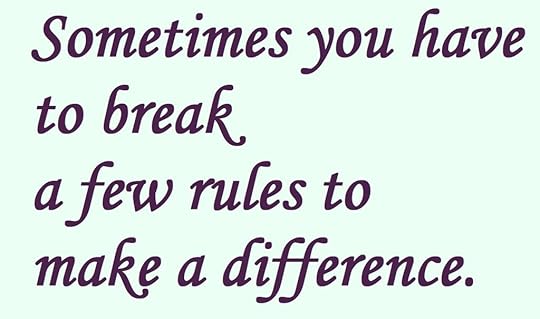
The post The Compassionate, Brave, And Defiant Southern Woman appeared first on How To Build A Piano Bench.
January 3, 2018
44 Sayings From Your Dad That Make Great New Year’s Resolutions
If you’re making New Year’s resolutions, remember the advice, warnings, and reprimands, your dad said to you when you were a kid.
Whatever Dad wanted you to do, chances are bosses want too. Whatever made your dad mad will likely make interviewers and bosses mad too.
Remember when Dad asked:
1. What do you think you’re doing!?
That is, do think about what you’re doing. Do things on purpose. Put Dad on your shoulder, and listen to him ask you, “What do you think you’re doing?” when…
*When you’re walking into a job interview: What do you think you’re doing? Maybe you think you’re there to “check it out.” Maybe you’re there to get a job. Either way, that’s likely to be what you’ll end up doing.
*When you join a group of people who are complaining about the boss or gossiping: What do you think you’re doing?
*When you’re blowing off the duties you don’t like: What do you think you’re doing?
*When you are doing anything where your judgment matters: What do you think you’re doing? Well, what?
When you had a disappointment or a problem, and you were ready to give up on because it seemed impossible to solve, Dad might have said:
2. There’s more than one way to skin a cat.
Or, “If at first you don’t succeed, try again” – but in a new way. If you can get creative in finding ways to get things done, you can ride that ability right to the top! Creative problem-solvers are prized in the workplace over people with skills and experience. Skills can be trained and experience can be gained.

3. Crying about it won’t fix it.
In your career, as in all of life, there will be all kinds of adversities – a failed deal, a lost opportunity, a lost job, a mean boss. But you can choose what you will do with your adversities – cry about them or make music!
“If you break up with your partner, go straight to the studio. You’re going to make great music.” B.o.B.

When you were going out to school, a date, or anyplace, maybe your dad said:
4. Cover yourself. You’re not going out in that!
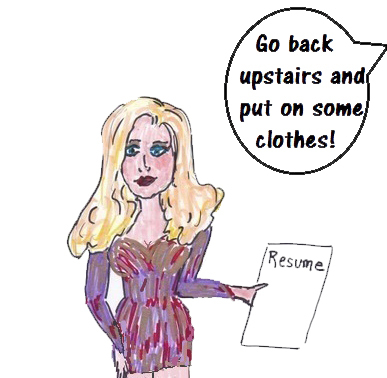
If your clothes were too revealing or outrageous for Dad, chances are they won’t work for the person interviewing you for a job either.
5. Go put on a clean shirt. Have some pride about yourself!
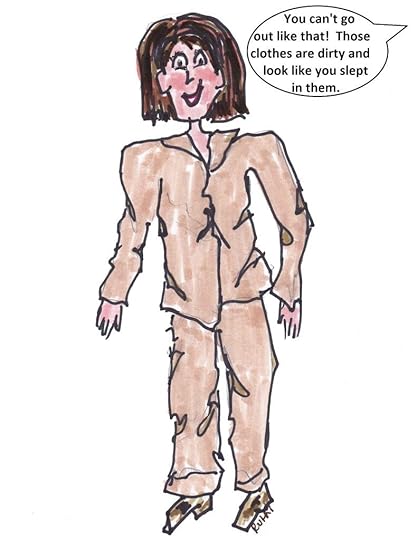
Most people don’t notice or care how much your clothes cost, but they notice if they aren’t clean and neat. Look in the mirror. What do your clothes say about you?
“She wears her clothes as if they are thrown on with a pitchfork.” (Jonathan Swift)

When you said you had a grade or a competition nailed, he may have told you:
6. Don’t get overconfident. When you let down, remember there’s someone else out there who’s still working to pass you.
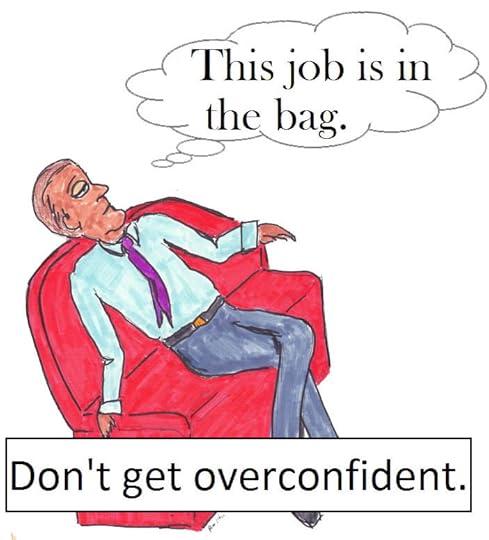
When you were being rude, angry, or a jerk, maybe he said:
7. Wipe that look off your face.
Don’t let your face give away thoughts that are best kept private. If you didn’t get the job, the problem may not be in your resume, but in how you were perceived. Arrogant? Disinterested? Complacent? Irritated?
8. Mind your manners.
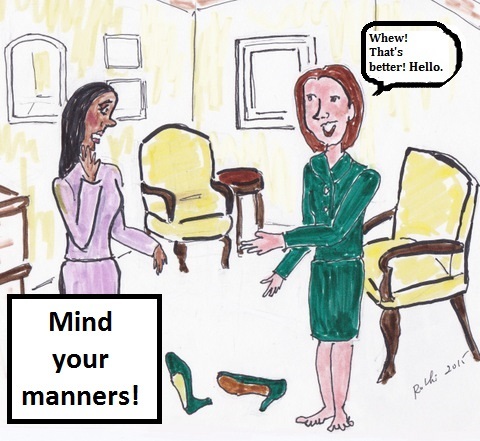
9. Who do you think you’re talking to?
10.Watch that mouth of yours!
What Dad may have told you about how to deal with people, be a person who is trusted, and get ahead in your career:
11. Don’t beat around the bush. Get to the point. People are busy.
12. Say what you mean and mean what you say.
13. Own up to your mistakes.
14. Think before you speak.
15. Adjust your attitude, Mister.
16. Hay is for horses.
17. Give me a straight answer.
18. You’re only as good as your word.
19. Speak up.
20. Don’t be afraid to blow your own horn.
21. Open your mouth and ask for what you want.
22. Don’t be afraid to ask questions.
23. I don’t care who started it, you stop it!
24. If you don’t know what you’re talking about, keep
your mouth shut.
25. Don’t burn your bridges.
26. I don’t want to hear your excuses.
27. Put a sock in it.
28. Don’t be a smart ass.
29. When it’s your house then you can make the rules!
15 more things somebody’s dad said sometime,and he was right again:
30. Open your eyes and look around you!
31. Put down that phone and read a book.
32. Get your act together.
33. You’d better straighten up and fly right!
34. You’re getting too big for your britches.
35. If you don’t want people minding your business,
36. keep it to yourself.
37. Fair!? You think life is fair?
38. Okay, know-it-all, don’t listen.
39. Don’t act smart.
40. Can’t never could.
41. Don’t bite off more than you can chew.
42. Just who do you think you are?
43. Stop slouching
44. Polish your shoes.
Apply Dad’s words to get the success you want in life.
The post 44 Sayings From Your Dad That Make Great New Year’s Resolutions appeared first on How To Build A Piano Bench.
December 13, 2017
Christmas Stories From Petain Street – Lights, Tinsel, Gifts & Thankfulness
As Christmas comes, I remember Christmases past when I was a child on Petain Street in South Alabama. They were times of awe and magic, of learning the joy of giving, and of starting rituals that would last a lifetime.
Some people just know how to receive a present!
 Petain Street was rich in old people who had time to share with a child. When I was ten, and finally allowed to go to Prichard all by myself, I took my allowance and went Christmas shopping at Kress’s 5 and 10. It was filled with treasures to buy – a fountain pen for Daddy, a little silver pin shaped like a flower for Grandmama, and the most splendid red beads for Mama.
Petain Street was rich in old people who had time to share with a child. When I was ten, and finally allowed to go to Prichard all by myself, I took my allowance and went Christmas shopping at Kress’s 5 and 10. It was filled with treasures to buy – a fountain pen for Daddy, a little silver pin shaped like a flower for Grandmama, and the most splendid red beads for Mama.
I still had a dollar left to buy gifts for three of the ladies – and what wonderful gifts I found! “Real” cut-glass vases! And they only cost a dime apiece. I could get plastic roses too! For my dollar, I got a vase with two red roses for each lady. I took them home and wrapped them with big, curly bows.
On Christmas day, I went to see the ladies and gave them their presents. They were all appreciative. But Mrs. Gates was the best. When she opened her gift, you’d have thought it was a Cadillac car. She looked at it with awe. “Ooooh, isn’t this the prettiest thing,” she crooned and hugged me. Then she traced her finger over every angle of the vase, held it up to the light and exclaimed, “My! My! My! Look how it sparkles, just like crystal.” Some people just know how to receive a present.
From that day on, whenever I passed her and she was talking to neighbors, Mrs. Gates called out to me and bragged that I was, “the best girl there ever was. Ruthi has never missed a Christmas. She always remembers the old folks and brings us a little something.” Even though I knew it wasn’t true, I loved her saying it, and I wanted to be the girl she told everybody I was.
Aunt Pauline – Style, Christmas trees, and recycling
Aunt Pauline had style you could see in everything she did, how she dressed, and how she always had her red hair fixed. (“When you have red hair, you can never let it go. It’s the first thing people will see.”) She made everything pretty. No plain blue, pink, and yellow Easter eggs for her! In her hands, the same PAAS dyes the rest of us used to make plain one-color eggs, turned out eggs that were stripped, speckled, and polka-dotted. But her annual masterpiece was her Christmas tree.
I remember the year I was finally big enough for Aunt Pauline to let me help decorate her Christmas tree. I gulped breakfast and skipped to her house. In the living room, stood her tree almost to the ceiling. It was surrounded by boxes of colored ornaments. She let me unwrap and hang the glass balls, making sure I mixed the colors and spaced them for best effect. With the colorful balls hung on the branches, the tree was beautiful.
“Now for the most important part,” she said, “the icicles [tinsel]! Icicles are what makes the tree!” She brought out an old Look Magazine. Between its pages were the long silver strands, arranged neatly, just a few to a page.
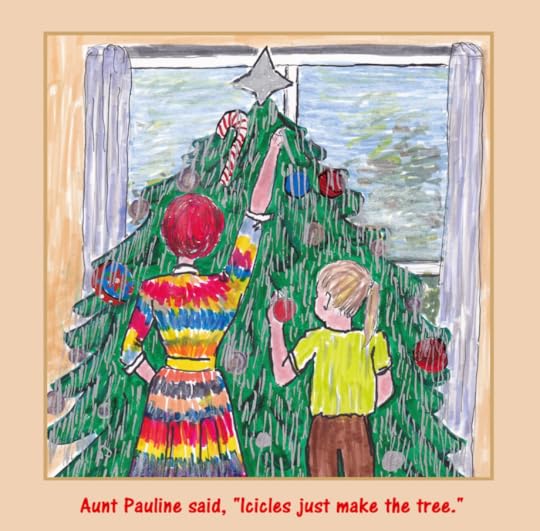
I knew Mama bought our icicles in a box. I asked Aunt Pauline why she put hers in a magazine. “To save them, of course. You can use the same icicles year after year – and icicles just make the tree. During the war, you couldn’t buy icicles. Aluminum was needed for ships. So, most people’s trees were plain. But my tree was always so pretty that people would drive by my house and stop to see it in the window.”
I grabbed for a handful. “No, not like that.” She took a few strands and showed me how to hang them. “You have to put them on one or two at a time so you fill all the branches. Some people throw them on, in clumps. That’s not good. Hang them long and even.” So I hung the precious strands, just a few at a time.
She plugged in the lights, and we stood back, looked at the tree. She said again, “Icicles just make a tree.”
Aunt Pauline – style, Christmas trees, and recycling too! Today we talk about recycling as though it’s a brand new idea. Recycling happened then because people didn’t have money to waste by throwing out perfectly good things to buy new. Outgrown dresses were cut down to fit the younger children or cut up to make quilts (my junior high school wardrobe came from my pretty cousin Mary Gayle’s closet). Broken things were fixed – televisions, toasters, radios, and frying pans. And Christmas decorations were passed down the generations.
This week I took out my boxes of glass ornaments to decorate my own tree. I finished it with the hundreds of icicles preserved between the pages of a big magazine – because o know. Icicles are what makes the tree.
The Christmas ritual
Getting ready for Christmas was the best part – putting up the tree, wrapping packages, trying to find where Mama hid the gifts Santa Claus would bring to me. Then, a  few days before Christmas, Mama, Daddy, and I would do our annual ritual. After supper, we’d get in our old, brown and white Plymouth Savoy and drive to Mobile to look at the Christmas lights.
few days before Christmas, Mama, Daddy, and I would do our annual ritual. After supper, we’d get in our old, brown and white Plymouth Savoy and drive to Mobile to look at the Christmas lights.
A few people in Prichard had decorations, but nothing like those we saw as we drove, first downtown to see the lights around Bienville Square, then zig-zagging through the neighborhoods between Dauphin Street and Spring Hill Avenue. With my face pressed against the icy window, I stared at the houses, where I was sure only very rich people must live because they were big and so beautiful with Christmas lights dazzling. Even the entrances to the streets were lit up with lights, garlands, stars, and angels.
I keep the ritual today, always hoping to recreate the feeling of awe I had on those Christmas excursions in Daddy’s old car when I was a child.
I wish you a very Merry Christmas and happy memories!
The post Christmas Stories From Petain Street – Lights, Tinsel, Gifts & Thankfulness appeared first on How To Build A Piano Bench.
December 5, 2017
As Long As You’re Stuck In The Wrong Job, Find A Way To Get Value From It
Sometimes you go into a job with the best intentions, then discover that it is just not right for you. It’s a fact I learned for myself in my own first job.
I graduated from college and did the one thing I was qualified to do. I became a middle school history teacher in Jackson County, Georgia.
I soon knew that this job was not right for me. It wasn’t because of the kids. Junior high-aged kids are funny and I enjoyed them, plus they taught me a lot. But a school system was something I’d never encountered before, a bureaucracy. And I just did not fit into a bureaucracy.
One of the hallmarks of a bureaucracy is the number and variety of forms. Before I ever met the kids, I was slammed by a wall of them. It was terrifying even to look at them.
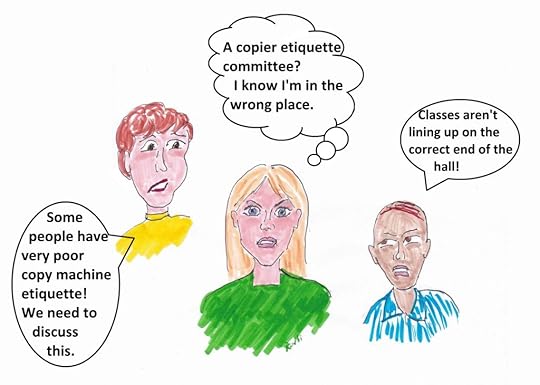 But there was something in the bureaucracy even worse that battling forms – meetings, in this case, teachers’ meetings. I described my first meeting in my book:
But there was something in the bureaucracy even worse that battling forms – meetings, in this case, teachers’ meetings. I described my first meeting in my book:
I sat there, miserable, as they dragged on and on, the monotony relieved only by near fist-fights when talk heated up on the crucial issues of which class should line up on which end of the hall for lunch, who was responsible for the messiness of the teachers’ lounge, or the correct use of the copy machine.
The copy machine thing was huge, and the pet topic of Sharon, who taught senior high math. In my first teachers’ meeting, she spent half of it ranting about the selfishness displayed by some of the staff regarding the copy machine. I’m not sure but I think she actually said, “You know who you are.” (Over the years spent going to as few meetings as possible, I found there’s one in every meeting.)
Mr. McKinsey, who taught social studies, was quick to come up with a solution. “I make the motion we set up a committee to draft a rule book for the copy machine and teachers’ lounge etiquette.”
I was drowning in a fishbowl. Was this the professional world? Did grown-up people really have nothing more important to get excited about than copy machine etiquette? And to then make an actual motion about it? And were there actually three people competing to second the motion? It was awful, but it got worse. I sat there imagining Sharon spontaneously combusting, and thinking, “I don’t belong here.” I was jolted back by someone saying my name.
“Ruthi, you haven’t expressed your opinion. Why don’t you be part of the committee?”
I really didn’t want to have a copy machine rulebook, let alone be involved in drafting one. This was my first meeting so I decided to be tactful. “I think it’s a big responsibility and I’m just learning all it means to teach. Let me think about it.” (from How To Build a Piano Bench; Lessons for Success From a Red Dirt Road in Alabama)
I went to Mr. Abernathy the next morning to convince him I shouldn’t be a part of the teachers’ meetings. “I think I detract from the meetings. I worked with a team in a psych class and one person wasn’t into the project. He brought the entire team down. I would hate to be the reason the meetings are less productive, so I think I should just not go.” He didn’t buy it.
So I was in the wrong place, and I felt stuck and scared that I’d never get out. The next question was: how do I get to my right career track?
How do I get from where I am to where I want to be if I don’t know where it is? Which way do I go?
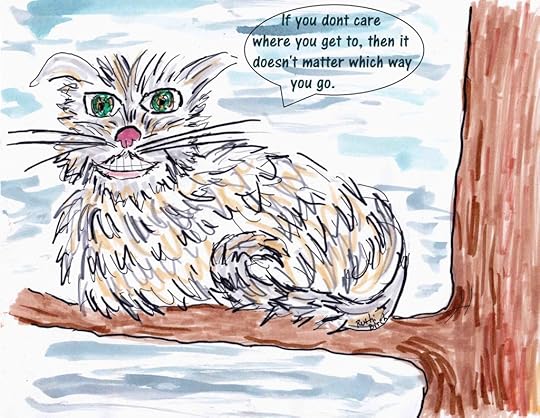 That question woke me up at three o’clock lots of mornings. I felt like Alice when she met the Cheshire Cat in Lewis Carroll’s Alice’s Adventures in Wonderland.
That question woke me up at three o’clock lots of mornings. I felt like Alice when she met the Cheshire Cat in Lewis Carroll’s Alice’s Adventures in Wonderland.
“Would you tell me, please, which way I ought to go from here?”
“That depends a good deal on where you want to get to,” said the Cat.
“I don’t much care where–” said Alice.
“Then it doesn’t matter which way you go,” said the Cat
I’d learned from Daddy that there is always one right next step. But I didn’t know what that step was because I didn’t know where I wanted to end up. Until I could figure that out, I had to make the best of where I was.
As long as you’re stuck in the wrong job, find a way to get value from it.
In my case, getting value meant making the job interesting and fun – for me. It seems selfish, but the more fun I had, the more the kids got out of my classes. I taught for the next two years. It was never where I wanted to be, but I learned things that helped me take the next step when I found it.
Three lessons I learned while I was where I didn’t want to be:
Where you are is not an island, far away from the path you’re meant to take. You are already creating your future.
You have the power to decide what you will take from the experience and to create value for yourself. You have the power to:
Throw yourself into being the best at what you’re doing today – for you.
Build a success pattern. Every success makes the next one easier.
Realize that whatever you accomplish here is yours and you get to take it with you.
You have an opportunity to learn about you.
Learn how to build on your strengths.
Find creative ways to compensate for your weaknesses.
Have you ever created value for yourself while in the job that’s wrong for you? How did you create it?
The post As Long As You’re Stuck In The Wrong Job, Find A Way To Get Value From It appeared first on How To Build A Piano Bench.
November 14, 2017
Don’t Listen to Naysayers. Make Your Dreams Come True!
A few nights ago, I did something I was told I couldn’t, and shouldn’t even try to do.
I stood on a stage and performed for an audience. The occasion was a launch party for my book, How To Build a Piano Bench; Lessons for Success From a Red Dirt Road in Alabama. I stood in front of the audience, spoke, told funny stories, and gave a reading.
After my performance, the audience stood up and applauded, or so my husband, Ron, told me later. I didn’t hear them when they laughed or applauded, and I didn’t know there was a standing ovation. I’d been transported to a place that was not excited, but calm.
Since I was a little girl, it had always been my dream to be on stage, entertain an audience, make people think, feel, and laugh. Now I was there, where I had been told I couldn’t go.
I started defining my dreams as a child when I played my favorite game, “play-like.” I’d make up stories and act out scenes, not for an audience, but all alone in my back yard.
The city is where I made-believe I was when I played alone in my backyard. My best toys were two sawhorses. Daddy had built them out of two-by-fours when he was building on Grandmama’s room. When I played cowboys, they were my horses. Sometimes I turned them over and leaned them against each other, and they became a big Cadillac car, like the ones in the old movies, with seats as big and deep as Grandmama’s bed and a gold lady on the hood. I put on Mama’s earbobs and beads and the yellow skirt Sister left in the closet—it was long and swung around when I walked. I looked as elegant as a movie star. I brought out ginger ale in the fancy glass goblet Daddy won at the fair, and played like I was in New York City, in a limousine, going to see a real live play, in a theater, with a man who was handsome and rich and so smart he could talk all day and never get boring. He poured champagne and kissed my hand and told me I was beautiful. (How To Build a Piano Bench: Lessons for Success From a Red Dirt Road in Alabama)
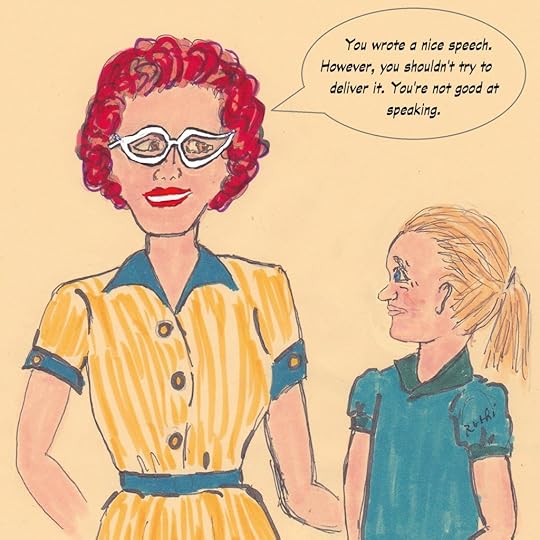
I’d sit in class or in church with Mama on Sundays and imagine myself on a stage, telling stories and entertaining people. Then, when I was in the ninth grade, a teacher told me to give it up, because it was never going to happen.
KJ Cark Junior High School had a class in speaking and acting for ninth graders, and I couldn’t wait to take it. I’d never been in a play or performed, outside of the Methodist Church junior choir. But now I was going to get the chance, and I was ecstatic.
Our first assignment was to write and give a speech, and I worked on nothing else for two weeks. But when the time came for me to give the speech, I froze. I knew it was bad. My face was hot. I could actually hear, for myself, how wooden I sounded as I spoke the words. Still, I hoped for some encouraging words from the teacher. I did not get what I hoped for.
“You wrote a nice speech, but you are not good at speaking. You should write and let other people give the speeches.”
I can still hear her and see her face as she said those words. She smiled. Her peach-colored face, framed by maroon-red hair, sported large, white cat-glasses, and she smiled that big, lip-stick smile.
I remembered her words the next time I tried to perform – and failed. When I was in high school, Mama met the director of the local playhouse and arranged for me to audition for a play. Once again, I froze stiff and dull. She was nice enough to give me a small part – as an old woman. I only had to sit in the audience, fall asleep during the play, and wake with a loud start at three appointed times. I threw myself into my role and I became that cranky old woman!
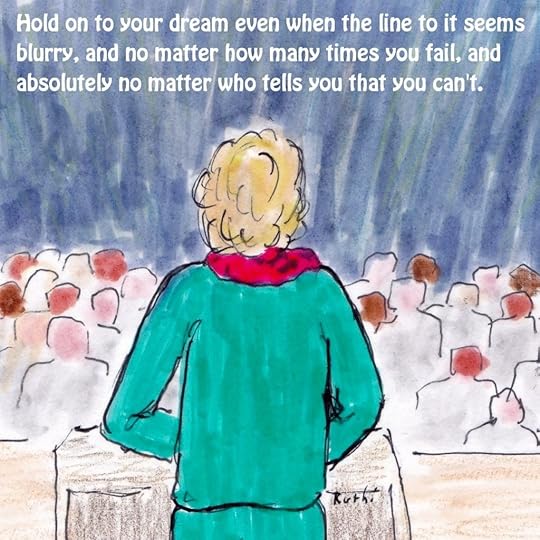
There! I’d proved I could perform. It was the audition that I couldn’t do. That play made me believe there might be hope for me if I could get on the stage without an audition, which didn’t seem likely.
I never again tried to do an audition, but went on with my life and my career, without the theater. But I realize now that I chose a career that fit into my dream – and without an audition! It gave me a stage, although it was a different kind of stage. My job was business development for a staffing firm, and the audience I performed for were employers in Washington D.C., my clients. As I helped them hire for their companies, I entertained then. I told them stories and made them laugh.
I also listened to their stories, gathered them up, and added them to my own experiences and the stories I’d heard growing up on a red-dirt road that straddled the poverty line in south Alabama. Some funny, some poignant, and many about overcoming obstacles, fears, and frailties, these stories and their lessons needed to be told. So I wrote my book.
As I wrote, I discovered my message and the voice that would find an audience. I wasn’t meant to stand and read lines in a vacuum. I had to be the character, whether it was an old woman or just me. I found my voice with my clients, then through writing, and it brought me to this place where I’d always dreamed of being.
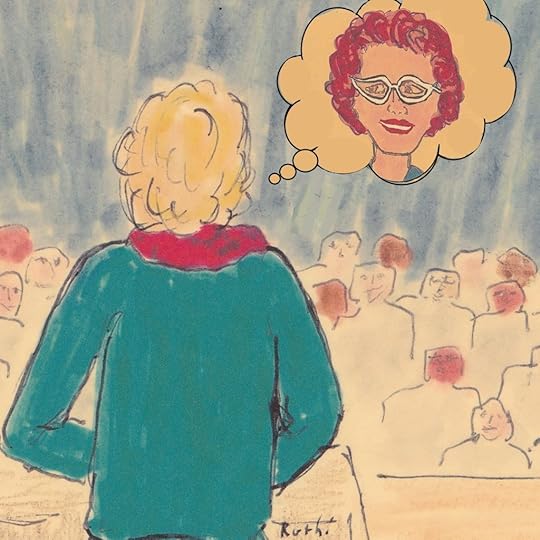
Maybe, for some people, there is a clear and distinct line from where they are to the place where they want to be, to their dreams. My line was not clear. It was so blurry that for some time, I didn’t know I was walking it, but as I look back, I see that I was already starting to live my dreams. I just had to keep living it and look for opportunities to take it further.
If you’re looking for your direction, the first step is to recognize your true dream, and sometimes that isn’t easy. I found mine in the games I played as a child. Maybe the games you played weren’t just games either. The next step is to hold on to your dream even when the line is blurry, and no matter how many times you fail, and absolutely no matter who tells you that you can’t.
And once you’ve reached your dream, what does it feel like? When I was on that stage, I felt a lot like I did when I played my stories in my back yard on Petain Street. I wasn’t afraid because I was the only one there, alone in my story.
For the last few days, I’ve been trying to figure out how I feel, or rather why I feel as I do. It’s not the same kind of excitement that I get from Ron or the people who called me or sent messages. How should you feel after you have finally done the thing you always felt you were meant to do? I just feel right.
The post Don’t Listen to Naysayers. Make Your Dreams Come True! appeared first on How To Build A Piano Bench.
October 30, 2017
A Day Filled with Old Southern Sayings Can Ruffle Some Feathers
I was looking for a document in my computer when I ran across a list of old Southern sayings, aphorisms, and proverbs I heard my family say when I was a child. We don’t often hear them anymore, and that’s a shame. They paint people, situations, and sensations in graphic colors. When Daddy described a neighbor as, “crookeder than a barrel full of snakes,” he did more than make a measly observation. He drew a cartoon worthy of The New Yorker.
I suppose I was bored and in need of some entertainment, so I began to imagine how people would react if I were to respond to their questions and comments with these old sayings. I was feeling feisty. If Mama had been there to see the look on my face, she’d have said, “I see the mischief in your eyes.” I decided I’d do it. Tomorrow would be a day of speaking in old Southern sayings.
I started in the morning.
At breakfast, my husband looked up from the news and said, “I’m worried about Max.” First, I had to do a mental checklist of the Maxs we know to figure out who he was talking about. We had just seen our grandson, Max, and he was fine. I didn’t know why he would worry about the carpenter who had put in the new screen door. Of course! He was referring to his man-crush, Max Scherzer, pitcher for the Washington Nationals.
I had the perfect response. “He’s all stove up again?”
Ron sounded distraught. “He’s out for the opening game of the playoffs.”

“Doesn’t that just get your goose? When will they learn that they can even work a good horse to death?”
“Huh?”
“I’ve gotta run. Today’s going to be busier than all get out.”
I drove off feeling full of myself.
At work I didn’t have to wait long for an opportunity to use a wise saying. One of the recruiters said, “I can’t believe people. Our client called me after she found the temp asleep under a desk in an empty office at three o’clock in the afternoon.
I cut in to say, “That cooked his goose!”
She stopped a beat, but went on. “Yes. I fired him, and you can’t imagine his attitude. He said he didn’t know why everyone was so upset. He was tired and knew he would do a better job when he was rested.”
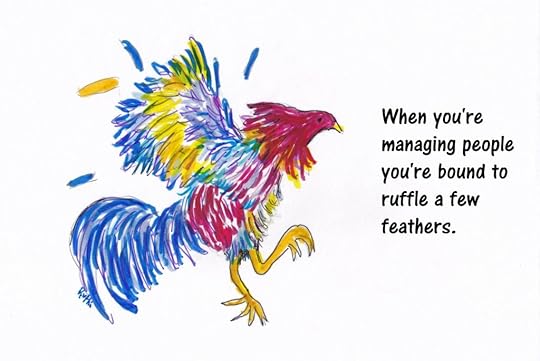
I gave her my most empathic look. “Some people don’t have the sense God gave a goose. That boy wasn’t raised right. What did the client say? I’m sure her feathers were ruffled.”
The recruiter looked puzzled, but just said, “No. Actually, she took it better than I did. She didn’t blame us, and I sent Tom to her as a replacement and he’s terrific.”
“Good. It sounds like you poured oil on the waters.”
Another recruiter hung up the phone with a disgusted sigh. She said, “That was Mary Jones calling to complain about the job again. I asked if she wanted me to replace her. She doesn’t.”
I was loving this.
“She is a worry-wart, but her complaints don’t amount to a hill of beans. She just likes to beat her gums. Don’t let her get your dander up.”
I went into the morning meeting happy as a pig in mud.
“It’s just two weeks till Labor Day. Every September the market starts going like a house afire we’re going to be up to our necks in jobs to fill. I know I’m preaching to the choir, but you recruiters are going to be busier than one-armed paper hangers. We need to get going so September doesn’t catch you with your pants down. It will be too late when you’re running around like chickens with your heads cut off. So let’s put our heads together on how to find the candidates we need.”
The staff looked at me, but no one asked the obvious question: What was wrong with me? So I quickly ended the meeting.
“Well, that’s all she wrote for today’s meeting. You all know what you need to do. Let’s knock it out of the park!”
I left the staff looking quizzical, and ran off to my meetings before anyone could comment.
When Ron came home, he asked how was my day, “It started out fair to middling, but went downhill faster than grease through a goose. By the way, you’re getting the short end of the stick tonight. Dinner is going to be catch as catch can. It’s been a day when the tail wagged the dog, and I’m plumb tuckered out.”
 He said, “Okay. You’ve had your fun. Now it’s time to stop.”
He said, “Okay. You’ve had your fun. Now it’s time to stop.”
“Oh. You don’t cotton to old sayings? They seem to make you mad as a hornet?”
“That’s it! Stop it. Let’s have a conversation like normal people.”
“Are you trying to say that’s the straw that broke the camel’s back.”
He screamed, “Stop it!! Stop now!”
“Sure as the dickens, you’ve got a burr under your saddle. Come on over here and give me some sugar.”
Ron left the room.
I smiled, proud as punch. It was a great day.
 Here are more of my favorite sayings – to use the next time I have a day of Southern sayings – and I will!
Here are more of my favorite sayings – to use the next time I have a day of Southern sayings – and I will!
Little pitchers have big ears.
Root, hog, or die!
There’s a tree stump in an Alabama swamp with a higher IQ.
Don’t throw out the baby with the bathwater
Put on my Sunday-go-to-meeting clothes
I’m happy as a pig in mud
Dead as a door nail
Mad as a wet hen
Gooder than snuff
Fine as frog’s hair
Flat as a fritter
Full as a tick
Till the cows come home
The post A Day Filled with Old Southern Sayings Can Ruffle Some Feathers appeared first on How To Build A Piano Bench.
October 16, 2017
The Best Way to Win Hearts in Life or Business is to Listen
I grew up in Prichard, Alabama, listening to people tell stories. Daddy, Grandma, and the people in our neighborhood were great story tellers. Petain Street was a colorful place, paved with Alabama red clay that dried to a fine dust that colored the old mill houses and permeated my clothes.This street, that straddled the poverty belt, prepared me for the career I’d have someday, first in business development, then in building my own staffing business. I wouldn’t have seemed destined for such a people business because I was afraid and awkward with people, and terrified when those people were in a group. But I learned that I could take the spotlight off of me by focusing on the stories other people had to tell.
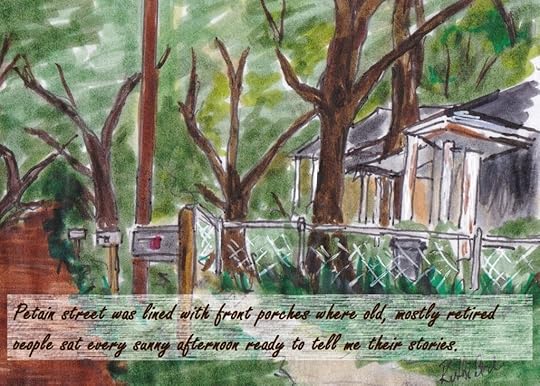
Lining the street were front porches where old, mostly retired people sat every sunny afternoon ready to tell me their stories. They taught me that people who didn’t look as though their lives would be all that interesting, actually had exciting, funny, or poignant stories to tell. They sent me into the world expecting people, all kinds of people, to have stories I’d want to hear.
I learned one of my most valuable career lessons when our elementary school had a drive to raise money by selling boxed all-occasion cards. As I went door-to-door to our neighbors, selling my cards, I discovered a secret that made selling so simple. All I had to do was listen to more stories. I’d knock on a door, and almost every time be invited to sit on a crocheted doily-covered chair or a porch swing, while the lady or man looked through the different cards. As they oohed and aahed over the cards, they talked, but not about the cards.
They told me where their children lived, how they had made doll bridal bouquets from the little white flowers that grew along the fence when they were little girls, or about the one-room schools of their childhood. Some people surprised me by telling me personal and sad stories, and I wondered why they would tell a child such private things. When their stories were finished, they gave me the two dollars to buy the box of cards. I was the only child who had to ask the teacher for more boxes, because I’d learned people would happily reward the person who would hear them.
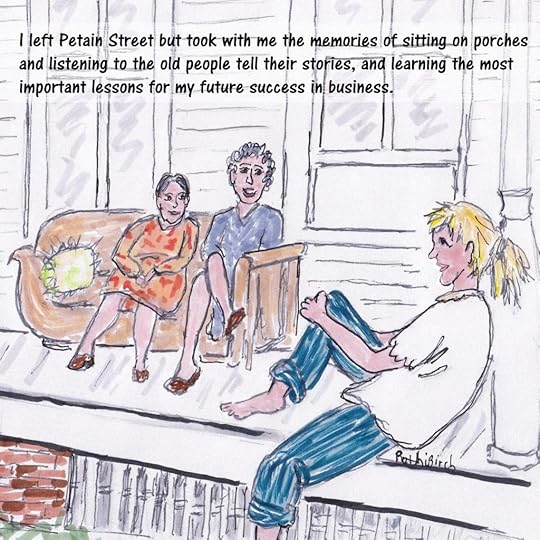
Then I grew up and left Petain Street. I’d always known I wasn’t going to stay there, because as far back as I can remember, Daddy told me, over and over, “You’re going to get you an education, get off Petain Street and amount to something.” So when I left, I took with me a burning ambition to be somebody. I also carried the memories of those old people and their stories with me, and I had no idea how important they would be to my future.
It took some time for me to find the right career, and when I did, I was determined to succeed – and terrified that I wouldn’t. Looking at me people wouldn’t have known how much I was afraid. I was afraid that people were judging me, that people wouldn’t like me if they really got to know me, and mostly I was afraid I’d fail and wind up back on Petain Street. Fear wouldn’t let me slow down for even a day or everything I had would disappear.
But I didn’t fail or go back to Prichard, and mostly because I used what I’d learned there, sitting on front porches and in parlors. People have stories to tell, joys to share, and pains to express, and they will give their time, their business, and their money to the person who will hear them. I listened to as many people as I could squeeze into a day, and my business grew.
I was even more surprised that these business people in Washington also shared personal, even heartbreaking, stories with a total stranger, but I gradually began to understand. There are some stories that hurt so much that the person has to talk about them, and so personal that they can only be told to a stranger who will listen.
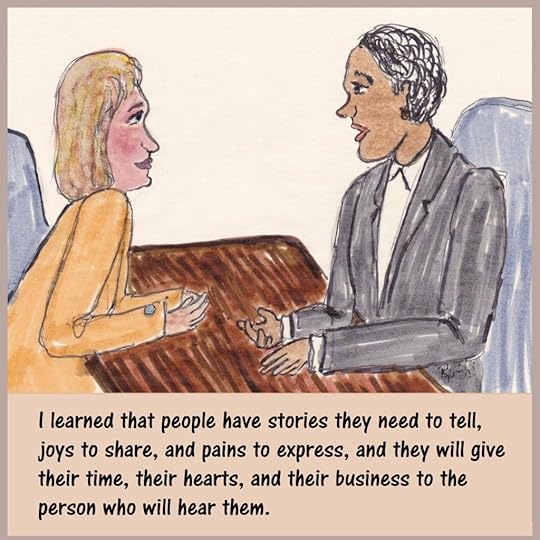
There came the day when I wasn’t the one listening, but I needed a stranger to hear me. I was in the office of a potential client, in the middle of a sales presentation when we were interrupted by his secretary who said my manager was on the phone and said it was important to interrupt us (this was before the day of cell phones). He handed me his phone.
My manager said my sister had called. I had to come to North Carolina—it was Mama and there wasn’t much time. I had to go now.
Business stopped. The man, whose business I’d come for, helped me make my airline reservations, supplied tissues, and listened. I told him all about Mama, how she looked when she smiled, how funny she was. I told him how I spent hours as a child drawing pictures of the house I would build for her someday. I had never gotten to do it, but last year I bought her an expensive coat—the first big gift I ever gave her. Now I would never have the chance to build her that house with terraces and a swimming pool and fountains.
I left his office for the airport to spend my last afternoon with Mama. Today, I don’t remember his name, if we ever spoke again, or whether we ended up doing business, but I do remember how it felt to have him hear me. He was the stranger who was there and willing to listen when I needed one.
Who needs for you to listen?
Who listens to you?
How do those relationships enrich your life?
The post The Best Way to Win Hearts in Life or Business is to Listen appeared first on How To Build A Piano Bench.
September 29, 2017
4 Magic Words That Will Make You Fascinating To People
If you want to attract and charm people, you have to be interesting. The secret to being interesting is not in what you say, but in how you respond to what they say. You can win people every day if you know the magic words.
I learned the magic words and the rewards for using them on a sticky-hot Alabama afternoon when I was nine years old. There was nothing to do. Mama and Daddy were working. Delilah was off visiting relatives. I didn’t even have Grandmama because Aunt Pauline had taken her to get a permanent wave.
I walked down Petain Street to Smith’s store to watch the butcher cut meat for a while. Walking home, I passed the poor old lady who had just moved into the lopsided shotgun house by the ditch. She waved at me and called out hello. There was nothing else to do, so I decided to join her, sat on the rickety front steps, and asked where she was from, though I didn’t expect her to be all that entertaining. What a surprise I got!
Mrs. Jackson was her name, and she had come from Chicago. When she described it, I could hear the sounds of music, wind, and horns blowing, and I could see the colors. All I could say was, “Wow!” and she kept talking.
She had done things that nobody else I ever knew had done. She told me she was pretty when she was a girl, and told me about dance places where she went dancing and men paid to dance with her. I just said, “Really?” and she told me more.
Mrs. Jackson told me that one night a friend dared her to get a tattoo – and she did it! Daddy had a tattoo, but no lady I’d ever met had one. “You’re kidding!” No, she wasn’t. It was a butterfly and it was on the top of her foot. She took off her shoe and showed me. “Wow!” She also told me they did it with needles (“Really?”) so I knew I’d never get one.
It was the best Saturday afternoon. Mrs. Jackson moved away soon, but she left me with stories to tell Delilah that she wouldn’t believe, and with three lessons for success that I would be invaluable to me in my career.
The 3 lessons for success I learned on a steamy summer day when there was nothing else to do.
People have wonderful, entertaining, and funny stories you’d never expect.
They will tell you their stories if you use the magic words.
The magic words are: Wow! Really? You’re kidding!
That fall, I saw again how the magic words worked when we had a school fundraiser. We raised money by selling boxes of birthday cards, Christmas cards, and all-occasion cards. I spent afternoons knocking on the doors of neighbors, mostly old people who lived alone and seemed happy to let me come in. We would sit on chairs that had crocheted doilies on the arms and they would look through the cards, ooh and ah at pictures of flower baskets, or puppies, or Christmas trees in snow, and launch into stories, not about the cards, but their lives. They told great stories! “Wow!” I listened. Then they bought my cards.
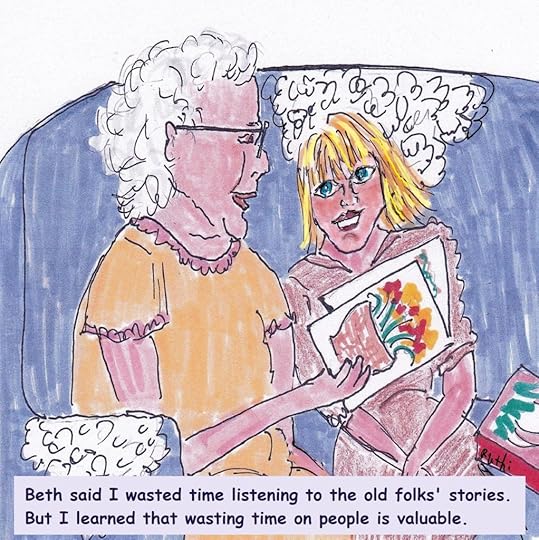 My friend Elizabeth told me I was doing it all wrong. She was in my class and was selling cards too. She said I was wasting time. I was supposed to stay at the door, show the cards, get the two dollars a box, and go to more houses. But I didn’t care what she thought. Maybe sitting and listening to people tell stories wasn’t her kind of selling, but I liked going in their houses, and I liked listening to the stories. So what if I didn’t sell right? So what if she said I wasted time, I thought, wasting time on people was good.
My friend Elizabeth told me I was doing it all wrong. She was in my class and was selling cards too. She said I was wasting time. I was supposed to stay at the door, show the cards, get the two dollars a box, and go to more houses. But I didn’t care what she thought. Maybe sitting and listening to people tell stories wasn’t her kind of selling, but I liked going in their houses, and I liked listening to the stories. So what if I didn’t sell right? So what if she said I wasted time, I thought, wasting time on people was good.
Not everybody I visited bought, but all my cards got sold and I had to get more boxes! Elizabeth didn’t have to get more boxes.
I learned another lesson.
Waste time on people.
When I grew up and came to my career in business, I found selling to businesspeople in Washington D.C. is no different than selling to the people on Petain Street. The lessons I’d learned about magic words and wasting time on people worked in attracting and keeping clients. The more intensely I listened to them, uttering just enough words to encourage and give them feedback, the more they talked. The more they talked, the more they bought.
Whatever business you’re in, most of success is about people and these four lessons hold the secret to success.
The secret of the magic words is:
If you want to be interesting, make the other guy feel fascinating. And if the other guy is fascinating, your life is more fun.
When have you wasted time on a person who surprised you with a great story?
What stories have you heard that made your life more interesting?
The post 4 Magic Words That Will Make You Fascinating To People appeared first on How To Build A Piano Bench.
September 18, 2017
Why Humor Beats Lecturing If you Want Results
The people on Petain Street had plenty of problems and too little money. But they were rich in humor and spent it like money to get what they needed. Humor entertained, it relieved tension, communicated ideas and lessons, and eased pain. I grew up knowing that humor’s greatest value is that it brings people together on a common ground.
It was also an excellent tool for teaching lessons to a stubborn child, as I learned first-hand. Mama was great at using this one.
Her wit was dry and sly, and her timing was just right. When I was in middle of my ninth-grade year, I got a failing grade in PE. I said I didn’t care, although I really didn’t like failing anything. I hated everything about PE – hated having to change into the awful, green jump-shorts that were mandatory, hated running around the track, and hated it that I was the last to be picked for any team. Furthermore, I was certain that some of the things they made us do were dangerous. For example, the backward roll. I was convinced it would cause me to break my neck and I’d be paralyzed for the rest of my life.
A few weeks ago, I wrote about Daddy’s admonition to, “keep your mouth shut,” if you wanted to stay out of trouble.
In this case, I didn’t take his advice, but let everybody know how I felt. As the year progressed, I complained and whined more and participated less.
When the second report card came, Mama didn’t say a word about the grade. Then, a week or so later, we were walking into the school together for some event and walked past a group of the scary, “bad girls,” the ones who bleached their hair and smoked cigarettes and went out with boys who rode motorcycles (it was a more innocent time). Mama smiled and said hello to the girls. As soon as we were out of earshot, I pulled her away and hissed, “Mama, don’t talk to those girls. They have the worst reputations in the school. Nice girls don’t want to be seen with them.”
Mama took my arm and turned, as though she was going to pull me back. “Come on then,” she said. “We need to go back there and make friends with those girls.” I looked at her, horrified, but she went on to her punchline, “If you fail PE, you can’t make it up in summer school. You’ll have to repeat the grade, and your friends will be gone. These are the girls you’ll need to be friends with, so let’s go meet them.” I passed PE.
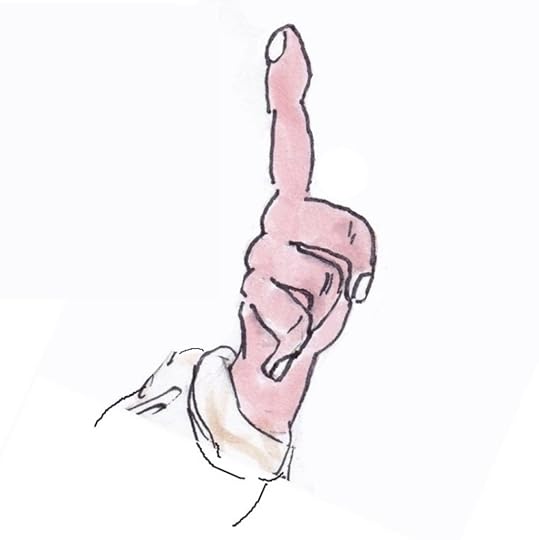
Mama had shown me how to change behavior with humor. When I grew up and built my career in a business dealing with people, there were times when I had to change the behavior of clients and candidates. The lessons from Petain Street were there for me.
I worked with some managers who hadn’t learned those down-home lessons. I saw personnel problems exacerbated because, instead of using humor to change behavior, they applied methods that weren’t effective.
Bring out the mother-finger, point it at the person, and lecture.
Ridicule and shame the person in public.
Threaten the person.
Fume, in silence, then complain to a different person.
Blow up and refuse to work with the person again.
They all change behavior – just not in any positive way.
A wounded animal in the office.

Waving the mother-finger at the miscreant might make you feel better. It might even force an apology. What you’ve really produced are shame, hurt feelings, and a wounded employee, and remember what they say about a wounded animal – it’s more dangerous. Public shaming not only wounds the person, but leaves those who witnessed it alarmed and unsettled.
Take your finger off the trigger.
Threats don’t change behavior because, “as a motivator, a gun only works once.” If you kill the person it’s over. If you don’t, the threat has no more muscle.
The back-stabber.
When you’re angry, venting to a third party feels so good, but it can’t possibly change the culprit’s behavior. Some managers tell other staff members about the offense, hoping to create societal pressure that reaches the person and forces change. It’s messy and doesn’t work. It is very effective, however, in letting your employees know you stab people in the back.

Is it a hanging offense?
Is ending the relationship too drastic a reaction? In that situation, Daddy would ask, “Is it a hanging offense?” Is it? If not, try a different approach. Try humor.
Humor gets results.
In any business, you encounter some maddening clients. I had a client who was almost impossible. He asked me do an urgent search for some top-notch and hard-to-find candidate, but once I’d found the candidate, I could not get him to return my calls.
I wanted to lecture, fume, threaten, and forget him. But I wanted to win more, so I decided on humor instead. I called and left this voicemail:
Hey, Joe, I heard a great joke! How do fleas travel from dog to dog?
If you want the punchline, return my call today – and by the way, I have two candidates for your job.
He returned my call within the hour and set up interviews for my candidates.
The punchline: They itch hike. (I didn’t say the joke had to be good.)
What situations have you been in where humor could have been used to better effect?
The post Why Humor Beats Lecturing If you Want Results appeared first on How To Build A Piano Bench.
September 5, 2017
My Daddy’s Blue-Collar Lesson For Success: Acceptance and Respect
The ability able to connect with people is critical to success in almost any career, and knowing when to keep quiet is key to connecting with people. Humor is another important quality, and I learned that too by listening to Daddy.
I was about to write about humor as key to success when the events of the past weekend brought to mind another lesson. I grew up in south Alabama with parents who had also grown up in the Deep South. They taught me a lesson that comes first and is far more important to success in business and in life than any of the others: Have respect for other people. I looked up the word respect.
Respect: due regard for the feelings, wishes, or rights of others.
But that definition didn’t take me close enough to what I learned from Mama and Daddy about how to treat people. So I looked up the word acceptance.
Acceptance: the action or process of being received as adequate or suitable, typically to be admitted into a group.
Before you can treat a person with respect, you have to accept that the person in inherently adequate and suitable, just as he or she is. Mama and Daddy showed me what it meant to receive people as adequate and suitable.
A few years ago, I got what I think was the best compliment of my life. I was at lunch with my boss who was in a terrible mood. She started by railing about some piece of business we had lost, but she got on a roll and expanded her rant to include mistakes I’d made going back a year. I finally said, “Enough. Say something nice to me or I’m going back to the office.”
She looked at me thoughtfully for a second and I expected she would say something acknowledging that I was the company’s top revenue producer. But she didn’t. She said, “You are the least judgmental person I’ve ever met. You accept every person you meet, just as they are.”I don’t know if my boss knew what a compliment it was or that it wasn’t actually my compliment. It belonged to Mama and Daddy. I was just living what they taught me. It’s not that they ever preached about it. They didn’t, and I don’t remember them ever saying the word acceptance. Their lessons snuck in when I wasn’t looking for them.
We lived in a segregated society where black people and white people were separated and acceptance wasn’t universally applied. Segregation was just the way we lived and I, a nine-year-old, didn’t think about black people much, until I got several unexpected messages from my parents.
On Saturdays, Mama worked at the grocery store and I went with Daddy on his errands. One Saturday, our first stop was to visit a man in the hospital who worked with Daddy. The man was black. Daddy didn’t act like us being there was a big deal. He talked with the man just as he talked to anybody else. He talked about the goings on at work, asked about his health, and made a joke at which they both laughed. Then we left. I asked why we went to see the man. Daddy said, “Because he’s sick.”
Daddy’s lesson stuck. People who are different and couldn’t even go to school with me were worthy of acceptance and respect. Over the years of my childhood, I learned a score more little lessons that Mama and Daddy didn’t even know they were teaching. Sometimes when we were riding in the car, I overheard snippets of conversation. Once I heard Daddy telling Mama something about a black man who owned successful businesses in Mobile, and was, “one good businessman!”
Mama added fairness as another component of respect when I heard her ranting about the DAR not allowing Marian Anderson to appear on their stage. “They should let the woman sing. It’s not fair! It’s not right.”
One afternoon, I was with Mama when we left the home of a seamstress who was taking in some hand-me-down clothes for me. The two women had hit it off and talked for an hour, and Mama left that house angry because she knew they wouldn’t be in places where she could talk to the woman any time she wanted to.
I realized, when I was grown, that the littlest actions my parents took without sermon or fanfare were so powerful in making me who I am. The values they expressed when that said seemingly inconsequential things I wasn’t even intended to hear became entrenched in me.
I made my career in a people business. Whatever success I’ve had has depended on my ability to attract, relate to, and work with all kinds of people. I’ve been able to do that because I learned about acceptance and respect from working-class people on Petain Street in Prichard, Alabama.
The post My Daddy’s Blue-Collar Lesson For Success: Acceptance and Respect appeared first on How To Build A Piano Bench.



